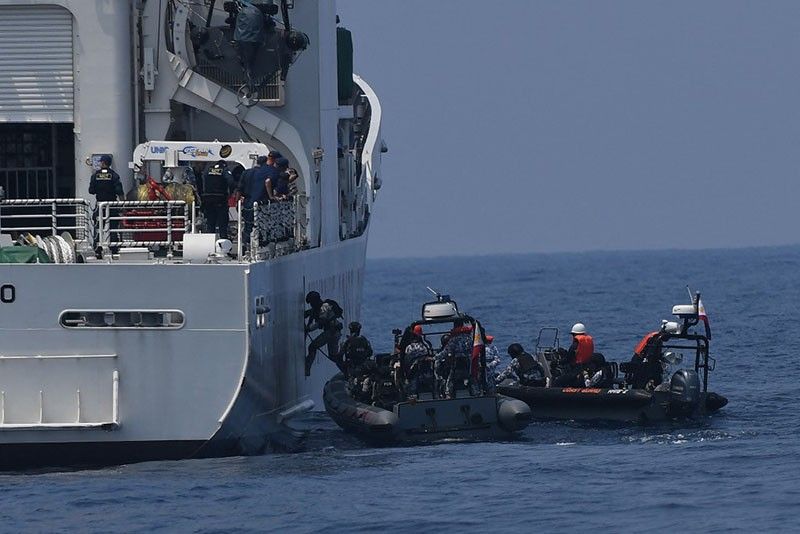A new quad with old security partnerships in the Indo-Pacific

Given Beijing’s constant disregard for the sovereignty and sovereign rights of its regional neighbors, along with its growing disapproval of the established rules-based order, the makings of a new security arrangement seem to have emerged on the sidelines of the Shangri La Forum in Singapore early this month to address these very challenges.
Accordingly, a first-ever quadrilateral security discussion was held between the defense heads of the US, the Philippines, Japan and Australia. Among the crucial topics that were discussed during this four-way meeting was a potential framework for quadrilateral joint patrols in the South China Sea later this year.
This emerging quad is important for the Philippines for two particular reasons. First, the US alliance network in the Indo-Pacific is based on a series of bilateral treaties, which is quite different from the collective security framework that is present in the North Atlantic Treaty Organization (NATO). This means that each bilateral treaty alliance of the US has its own unique and independent characteristics, that are not operationally linked to its other bilateral treaty alliances in the region. Hence, the term “hub and spokes” system is often used to characterize this network.
Therefore, by forging a quad framework with the three “spokes” of the US Indo-Pacific alliance network, all four countries will be able to harmonize efforts and address the structural gaps that were present in the traditional alliance structure. This will also add more significance to the alliance system in the Indo-Pacific in its ability to collectively address issues of mutual concern and interest.
The assertiveness of China continues to spill over not only in the South China Sea, but also the East China Sea and the greater Western Pacific Ocean, as it seeks to pursue its narrowly defined regional ambitions. The first trilateral sea drills between the US, the Philippines, and Japan that took place on June 1 to 7 is a significant step towards this collective goal.
All four countries share similar threat perceptions in this regard. Moreover, by enhancing interoperability, information-sharing, and strategic coordination, the Philippines will be able to leverage this arrangement to bolster its maritime security, territorial defense, and deterrence capabilities. Being technologically advanced countries, the US, Japan, and Australia will also be able to create conditions for the sharing of critical defense technology and expertise to the Philippines, which will not only help it inch closer to its bid to modernize its military, but also improve its cyber defense capabilities.
Second, the inclusion of the Philippines in this emerging quadrilateral framework will solidify its geopolitical significance and centrality in the Indo-Pacific region. The region is characterized by its diversity and dynamism. Hence, given such properties, the need to accordingly augment the nature of international cooperation is crucial. Therefore, the rise and proliferation of loose, informal, and area specific arrangements among like-minded countries serves as the defining attribute of Indo-Pacific politics.
Therefore, new equations are being devised and old partnerships are being sharpened among like-minded countries that share a common goal of securing the established regional order. While the Quad -with Australia, US, Japan and India is being deepened with greater integration of synergy and security context other more directly mutual security linked arrangements are being worked out. Additionally, the AUKUS also continues to be going forward smoothly.
Consequently, the emerging Quad with the Philippines will not disrupt, but rather complement existing security arrangements. The four-way framework between Washington, Manila, Tokyo and Canberra may significantly focus their operations towards the South and East China Seas. Given the shared alliance networks of all four countries, collective decisions and actions may be much smoother than other similar arrangements such as the Quad with India where New Delhi is not a treaty ally of the US.
Nevertheless, the Philippines may also be able tap on and benefit from both complementary quad arrangements if efforts are made to synergize capabilities, given that Manila and New Delhi have also been strengthening their security partnership since 2016. This will allow the Philippines to maximise its diplomatic and strategic linkages towards the greater Indo-Pacific, and not merely within the South China Sea.
Therefore, whether the arrangement will be termed as a new Quad among treaty allies or not is immaterial as along as the challenge from China remains in sight, attributing to Shakespearian delight “What is in a name”. Accordingly, such a development is crucial for the Philippines amid its desire to safeguard its sovereignty and sovereign rights.
However, what will matter most is the ability of all four countries to consistently cooperate and seek to deepen and broaden their evolving four-way partnership. In the past, several security arrangements have come and gone. Therefore, the role of consistent coordination and engagement will be crucial for Manila to maximize the utility of this emerging quad.
---
Ambassador Anil Trigunayat served as India's Ambassador to Jordan, Libya, and Malta. He is a distinguished fellow with the prestigious Vivekananda International Foundation and was recently appointed by the Indian Government as an Independent Director on the Board of WAPCOS a mini- Ratna Government Company.
Don McLain Gill is a Manila-based geopolitical analyst, author, and a lecturer at the Department of International Studies, De La Salle University (DLSU). He is also the Director for South & Southeast Asia, Philippine-Middle East Studies Association (PMESA).
- Latest
























